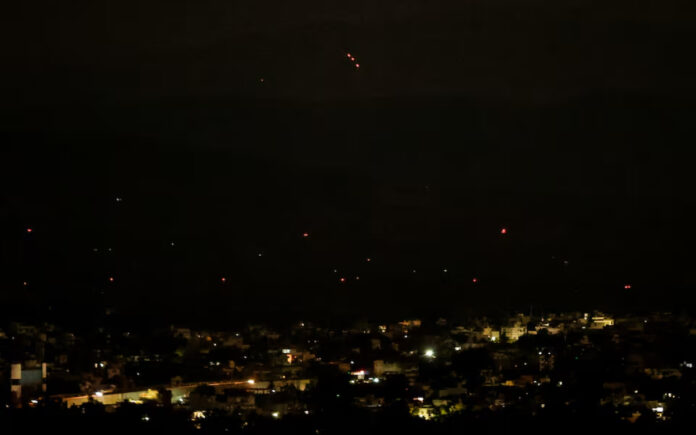Islamabad/New Delhi: India and Pakistan, both nuclear-armed neighbours, agreed to a sudden ceasefire on Saturday following intense diplomatic efforts led by the United States. The agreement came as a surprise following four days of heavy cross-border fighting that threatened to spiral into a full-scale war.
However, within hours of the ceasefire announcement, reports of fresh violations emerged from Indian-administered Kashmir. Explosions were heard in the cities of Srinagar and Jammu, while residents and officials reported flashes and projectiles lighting up the skies over Jammu, similar to the hostilities witnessed the previous evening.
Military spokespeople from both sides did not immediately issue any statements in response to the reports of renewed hostilities.
The latest round of violence marked the most severe confrontation between the two South Asian rivals in nearly 30 years. The clashes, which escalated rapidly, prompted concerns that nuclear weapons might come into play. Speculation grew when Pakistan’s military announced that its top nuclear command body was expected to meet. However, Pakistan’s Defence Minister later clarified that no such meeting was planned, offering a momentary reassurance following a night of intense combat and a civilian death toll that had reached 66.
“Pakistan and India have agreed to a ceasefire with immediate effect,” Pakistani Foreign Minister Ishaq Dar posted on X. “Pakistan has always strived for peace and security in the region, without compromising on its sovereignty and territorial integrity!”
India’s Foreign Secretary said that both countries’ military chiefs had communicated directly and agreed to halt all hostilities from 5 p.m. Indian Standard Time (1130 GMT), though the term “ceasefire” was notably absent from the statement.
U.S. President Donald Trump confirmed the breakthrough via social media: “After a long night of talks mediated by the United States, I am pleased to announce that India and Pakistan have agreed to a FULL AND IMMEDIATE CEASEFIRE. Congratulations to both Countries on using Common Sense and Great Intelligence.”
Hotlines and Global Mediation
Dar revealed to Geo News that military hotlines between India and Pakistan had been reactivated and that approximately three dozen countries had played a role in facilitating the ceasefire agreement.
India’s Foreign Secretary Vikram Misri stated that the military chiefs from both nations would hold further discussions on May 12 to ensure compliance and stability.
Tensions reached a boiling point earlier in the week when India launched strikes on what it described as “terrorist infrastructure” in Pakistani-administered Kashmir, two weeks after a deadly attack claimed the lives of 26 Hindu tourists in Indian Kashmir. Pakistan denied any involvement, and the subsequent days were marked by a dangerous escalation, including shelling, drone attacks, and missile fire across the Line of Control.
Also Read | Trump Announces Sudden India-Pakistan Ceasefire Amid Fears of Nuclear Escalation
Despite the agreement, Indian government sources, as reported by the international news agency Reuters, said that punitive measures imposed by both countries—such as trade suspensions and visa cancellations—would remain in effect. Furthermore, India’s suspension of the 1960 Indus Waters Treaty would also continue for the time being.
The Indian Ministry of External Affairs declined to provide further comment on the status of bilateral relations.
U.S. Secretary of State Marco Rubio said he and Vice President JD Vance had engaged in intensive talks over a 48-hour period with Indian Prime Minister Narendra Modi, Pakistani Prime Minister Shehbaz Sharif, Indian Foreign Minister Subrahmanyam Jaishankar, Pakistan’s Army Chief Asim Munir, and both countries’ national security advisors.
Talks Planned at Neutral Venue
Rubio announced on X that the ceasefire agreement also includes plans to initiate broader discussions “on a broad set of issues at a neutral site,” signaling a possible path toward long-term de-escalation.
Indian Foreign Minister Jaishankar reaffirmed India’s commitment to combat terrorism, stating, “India has consistently maintained a firm and uncompromising stance against terrorism in all its forms and manifestations and will continue to do so.”
The announcement of the ceasefire was welcomed on both sides of the border. Pakistan’s civil aviation authority confirmed that the country’s airspace had been fully reopened. In Indian Kashmir, local leader Omar Abdullah expressed cautious optimism: “If it had happened 2-3 days ago, the lives we lost would not have been lost.”
Also Read | India-Pakistan Ceasefire Agreement Doesn’t Address Indus Waters Treaty Suspension
Footage from Pakistani news outlets showed military vehicles, including tanks, being withdrawn from border regions.
Ehsan Malik, CEO of the Pakistan Business Council, underscored the need for peace: “Both Pakistan and India need to lift their large populations on virtually every measure of socio-economic development. We are happy that a ceasefire will help both the governments to focus on this priority.”
Shuja Nawaz, a distinguished fellow at the Atlantic Council’s South Asia Center, suggested that water-sharing under the Indus Treaty would be a critical point in future talks. “It will figure prominently in the impending talks after a decent interval, which allows both governments to claim credit for what they’ve achieved until now,” he said.
India and Pakistan have been locked in a territorial dispute over Kashmir since their independence from British rule in 1947. The region has sparked three wars between the countries—two of them directly related to Kashmir—and numerous smaller skirmishes.
India continues to accuse Pakistan of backing an armed insurgency in Kashmir that began in 1989, along with supporting Islamist militant groups responsible for attacks within India. Pakistan denies these allegations, asserting it only offers political and diplomatic backing to the Kashmiri separatist cause.



